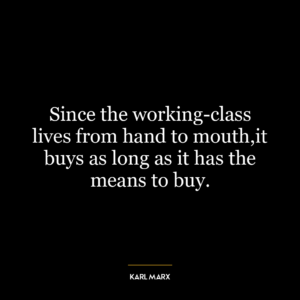This quote essentially means that capitalist production is intrinsically tied to foreign commerce or international trade. Capitalism, as an economic system, thrives on the principles of free trade and competition. It operates on the idea that businesses should be allowed to compete without undue restrictions, and the ones that can provide the best goods or services at the most competitive prices will succeed. This competition isn’t limited to within a country’s borders; it extends beyond to the international market.
Foreign commerce allows businesses to expand their market reach, source cheaper or better-quality raw materials, and even move production to countries where labor costs are lower. It’s a way of maximizing profits, which is a key objective in capitalism. Without foreign commerce, businesses would be limited to their domestic markets and resources, which could hamper growth and profitability.
Applying this idea to today’s world, we can see that globalization and technological advancements have made foreign commerce even more integral to capitalist production. Multinational corporations source materials, manufacture, and sell their products all over the world. For instance, an American tech company may design its products in the US, manufacture them in China, and sell them globally. This global supply chain allows the company to take advantage of the best resources and markets worldwide, thereby maximizing profits.
In terms of personal development, this quote could be interpreted as emphasizing the importance of broadening one’s horizons and not limiting oneself to local or familiar environments. Just as businesses benefit from engaging in foreign commerce, individuals can also grow and develop by seeking new experiences, learning from different cultures, and embracing global opportunities. This could mean traveling, learning a new language, pursuing an international education or job opportunity, or simply being open to different perspectives and ideas.















